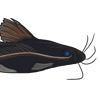TDS: Total Dissolved Solids. A way to calculate water quality by measuring organic and inorganic substances present. Total Dissolved Solids are measured in mg/l(milligrams per liter) and may be measured in a laboratory or, more conveniently, by electronic meter. Similar to conductivity.
I could be wrong, but I think deionized and distilled water are one in the same. I've been searching for the term distilled and can't find it. Can anybody else find it?
Inorganic: Chemical compounds which are not Carbon-Hydrogen based.
Organic: Chemical compounds which are Carbon-Hydrogen based.
Thanks for the help, Mats.
Amanda











